Imagine you’re part of the team that develops a new drug to help patients fight cancer, or that you’ve discovered a new way to improve an existing drug, making it more effective. In the field of pharmaceutical sciences, these kinds of opportunities to make a difference are unlimited.
The pharmaceutical sciences include a broad range of scientific disciplines in which new drugs and therapies are developed, tested, and studied. The field is often classified into several categories, some of which include the design and synthesis of new drug molecules, how drugs are delivered to a patient, and how the drug works in a living system.
To help meet the varying needs of this broad field, Northeastern has developed four programs within the pharmaceutical sciences, each of which is tailored to a different aspect of the field.
These four programs offered at Northeastern include:
- The MS in Medicinal Chemistry, which integrates contemporary medicinal chemistry and pharmacology with an emphasis on therapeutics design, discovery, and action.
- The MS in Pharmacology, which explores how drugs interact with biological systems.
- The MS in Pharmaceutical Sciences, which seeks to produce specialists in drug formulation and delivery that can use many different approaches to create and target treatments.
- The MS in Biomedical Sciences, which explores human pathophysiology and the application of existing and potential therapeutic approaches to treating disease.
Each program offers a niche curriculum, effectively preparing students for a successful career in the specific correlating field. However, the inclusion of four unique programs across disciplines also allows students to tailor their education even further by taking courses across the various areas of study. As a result, students graduate better prepared to enter into the field or advance within their current pharmaceutical science job.
Below we offer a closer look at each of the programs and explore what you can expect when you graduate with your master’s from a top university like Northeastern.
MS in Medicinal Chemistry
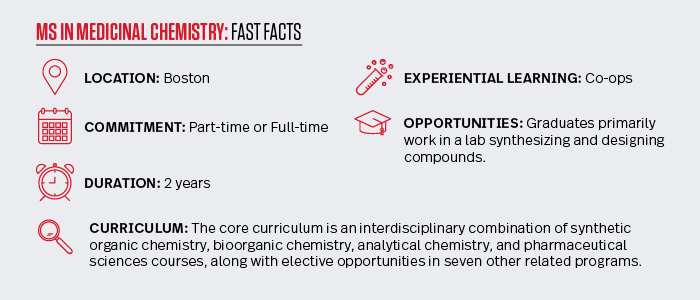
The master’s in medicinal chemistry program at Northeastern integrates contemporary medicinal chemistry and pharmacology, providing students with a combination of synthetic organic chemistry, bioorganic chemistry, analytical chemistry, and pharmacology courses. Students enrolled in this program are most often interested in producing new chemical compounds that have drug-like properties and that would hopefully become candidate drugs, explains David Janero, visiting professor and director of the pharmaceutical sciences graduate programs at Northeastern University. As a result, many graduates have established research careers in the pharmaceutical or biotech industries.
Graduates of this program will often enter roles in medicinal chemistry, working in a “wet-lab” environment, synthesizing and designing compounds. In contrast, “a PhD graduate might go into the pharma biotech industry as a project leader, project director, or senior scientist, [which is] someone who is at the decision-making and influencing level,” Janero says.
MS in Pharmacology
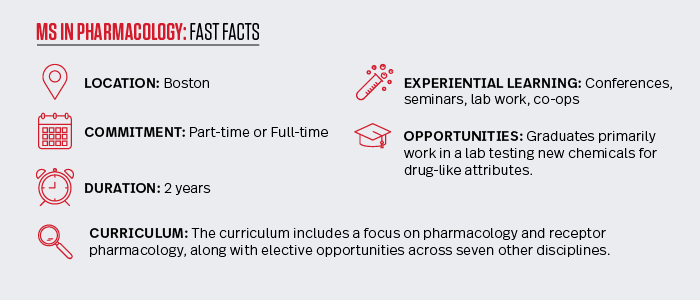
The master’s in pharmacology program explores the principles and mechanisms of drug action in biological systems. Students gain exposure to both classical and recent approaches that have led to the development of current theories of drug action and therapeutic application.
Keep in Mind: The master’s in pharmacology program should not be confused with the doctoral degree in pharmacy, which leads to professional licensure as a pharmacist.
Pharmacologists are responsible for testing the new chemicals that a medicinal chemist has produced. “They test and profile these chemicals to see how drug-like they are. Are they able to be dosed? Do they have properties that would suggest they might be drugs that help prevent or treat a disease?” Janero says. “This information is then shared with the medicinal chemist so they can work together to improve those compounds and make them more drug-like.”
Advance Your Career with a Pharmaceutical Science Degree from Northeastern.
Learn how to transform your career in an industry that’s transforming the world.
This tailored work sets graduates up for success as pharmacologists, active in laboratory research to help advance new drugs to the clinic, Janero says.
MS in Pharmaceutical Sciences
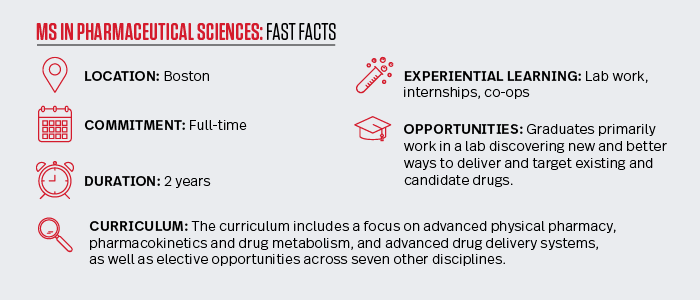
The master’s in pharmaceutical sciences program focuses on improving the understanding and description of how chemical and physical properties of drugs and dosage forms affect drug performance in both healthy and diseased systems. There is a strong focus on nanotechnology-based advanced delivery systems that address therapeutic needs, Janero says.
Students in this program at Northeastern can choose from four concentrations, including:
- Novel drug delivery systems
- Biopharmaceutics and pharmacokinetics
- Physical pharmacy and polymeric dosage form development
- Drug metabolism
“Pharmaceutical scientists study how systems interact with drugs,” Janero says. “The questions they aim to answer include: how a drug gets to the place that it needs to get to in order to be therapeutic, how we can improve the delivery of the drug, and how the body metabolizes it,” he says.
Graduates will typically enter roles as drug metabolism scientists, drug delivery scientists, or pharmacokinetics.
MS in Biomedical Science
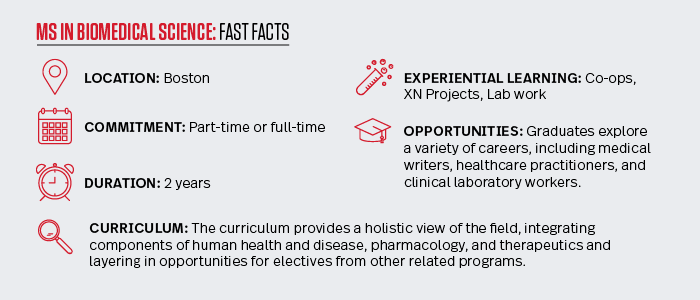
Students in the master’s in biomedical science focus on areas across the biomedical sciences to gain training in pathophysiology and the application of existing and potential therapeutic approaches to treating disease. This program is designed for people entering or currently employed in this field, including research technicians, clinical laboratory workers, science teachers, and science administrators.
Learn More: Master’s vs. PhD in Biomedical Science: What’s the Difference?
“This is a more general umbrella program with the application of drugs as therapeutics to address unsolved medical problems,” Janero says. “People in this program might be thinking about a career in nursing, as physician assistants, or are looking for more of an understanding of how the body works, how drugs are applied to human disease, the unmet medical needs, and how these problems could be addressed or improved in different and new ways.”
What Can You Do With a Degree in Pharmaceutical Sciences?
Alongside the many tailored positions that students of each program are set up to obtain after graduation, there are many general characteristics of the pharmaceutical sciences field that make it an enticing industry to work in.
According to the Bureau of Labor Statistics, for instance, career opportunities in this field are growing faster than the national average, making it an attractive industry for those with an interest and background in biology and chemistry.
While many advanced positions in this field do require a PhD, master’s degree holders have a vast array of exciting opportunities as well, Janero says.
“The main difference between jobs that require PhDs and Masters’ degrees is the level at which you’ll enter the workplace,” he says. “People with a master’s enter at the technical level—they’re the worker bees carrying out the nuts and bolts, and [they] are really important because they’re the ones actually doing the work.”
Professionals with PhDs hold supervisor roles in which they’re responsible for decision making, he adds. “While people with a Master’s are at the bench, those with a PhD assume more of a consulting role.”
The Northeastern Difference
Northeastern understands that some students may be undecided about which specialized degree to pursue. That’s why these programs are built upon and require the same fundamental core courses, allowing you to easily transfer into or choose the program that’s the right fit for you. In addition, graduates of these programs are well-prepared to easily parlay their training into Northeastern’s leading PhD programs, fast-tracking their education by skipping core courses they already covered at the master’s level.
According to Janero, professionals looking to take their career in the pharmaceutical sciences to the next level choose Northeastern for a number of reasons. Not only is the university in the heart of Boston alongside the top hubs for medical practice and research, but Northeastern is unrivaled in active research programs and experiential learning opportunities.
“[Northeastern] has active research programs with committed scientists who are involved in all these [pharmaceutical sciences] areas. They’re not only teaching, they’re performing research, too,” he says. “And biotech and pharma companies in the Boston area love our co-op program because our students do so well—we insist on a certain level of academic performance. That practical experience is a feather in their cap.”
Learn more about Northeastern’s four programs in pharmaceutical sciences, then get in touch with an enrollment coach to figure out which one is the best fit for you.

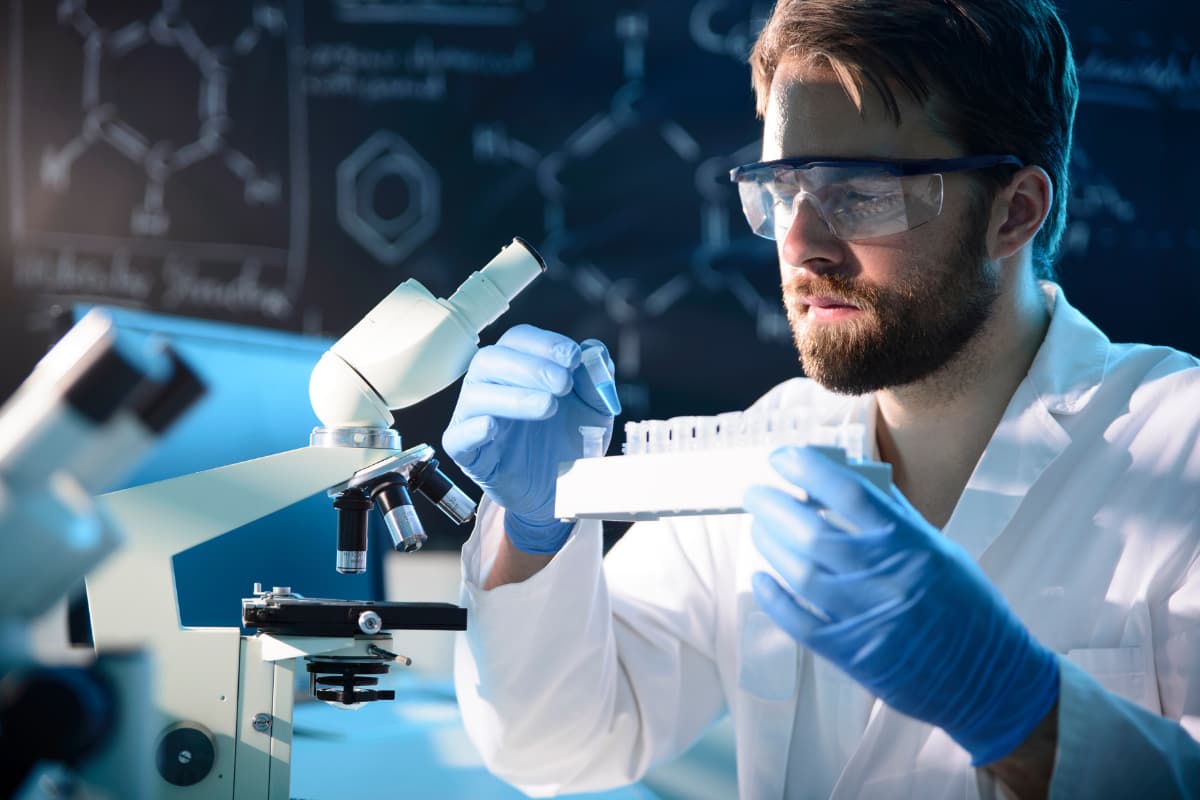
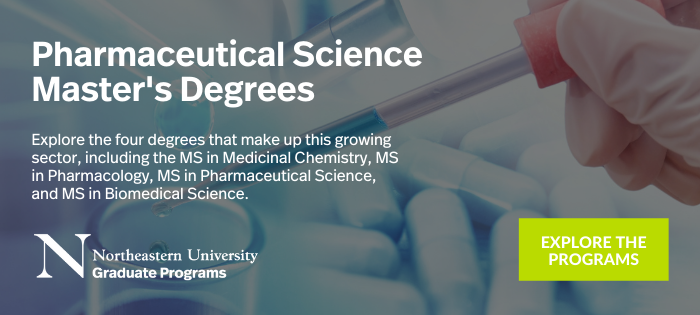




Related Articles
PhD vs. Master’s in Biomedical Science: What’s the Difference?
10 Top Careers in Biomedical Science
What is Medicinal Chemistry?